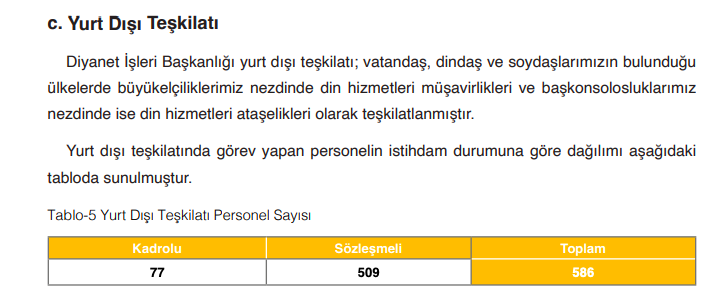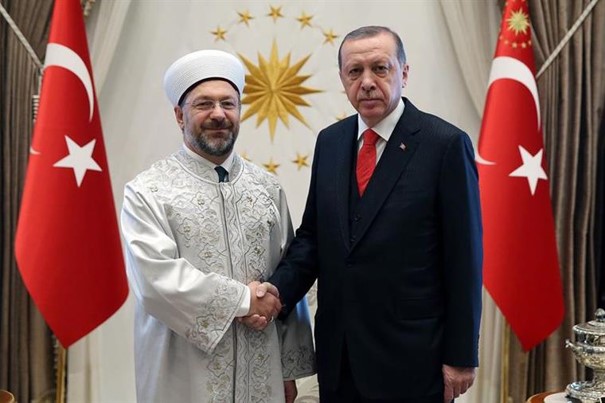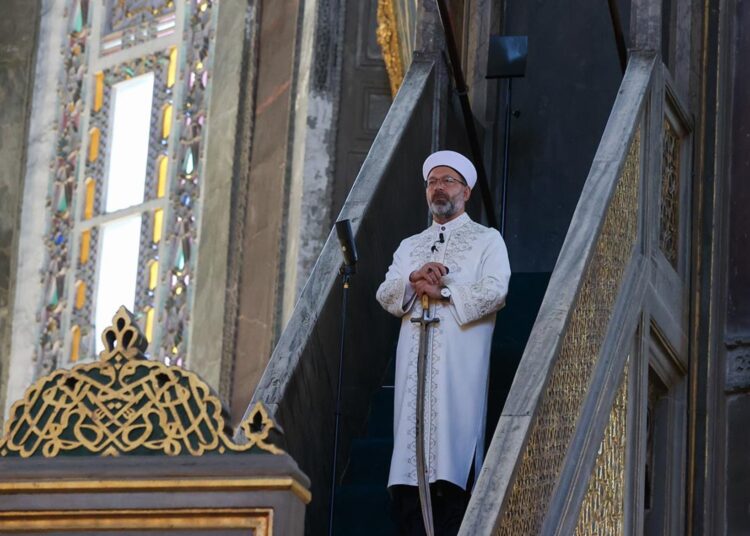Levent Kenez/Stockholm
Turkey’s controversial Religious Affairs Directorate, commonly known as the Diyanet, unveiled its five-year strategic plan last week. The plan addresses concerns regarding policy changes in countries in which it operates, highlighting the risk of activities being impeded as a result.
Additionally, it acknowledges that the low salaries offered to contract employees residing abroad pose a significant problem, exacerbated by Turkey’s economic challenges.
The Diyanet’s five-year strategic action plan ironically draws attention to the increasing secularization of Turkey under a government with Islamist leanings for the past 22 years, underscoring the risks posed by this trend.
Furthermore, the plan identifies challenges in reaching out to young people, particularly university students, and suggests that mosque associations be linked to the Directorate of Religious Affairs
The plan notes that as of October 2022, the salaries of personnel serving abroad under contract status were increased. However, it was observed that this adjustment did not meet the expectations of the contract employees, leading to the resignation of more than 100 personnel. Therefore, it recommended that the salaries of contract religious employees be re-evaluated, taking into account the state of affairs in the foreign country, to make the International Theology Program and the employment of overseas contract religious personnel more attractive.
According to the updated statistics provided in the plan, the Religious Affairs Directorate has a total of 586 staff members working abroad, consisting of 77 sent from Ankara and 509 local hires.
The plan also outlines measures to be taken in the event of changes in bilateral relations or variations in the policies of the countries where services are provided. Some European countries have expressed concerns regarding the support provided by Diyanet-employed imams to radical groups and their transformation into a network gathering information for Turkish intelligence and other state institutions. For instance, Germany and Austria have mandated the employment of their own citizens of Turkish descent rather than appointing religious officials from Turkey.

In response, the Diyanet’s strategic plan emphasizes the establishment of good relations with these countries. It suggests highlighting the benefits of religious services and the promotion of cooperation between countries to address these concerns and foster mutual understanding.
Additionally, the Diyanet plans to work towards strengthening the capabilities of nongovernmental organizations established by Turkish citizens abroad and encouraging them to actively utilize existing hate crime complaint and reporting mechanisms within international organizations.
Turkey’s Diyanet boasts a substantial budget and employs approximately 140,000 people in Turkey and abroad, overseeing around 90,000 mosques. Its budget for 2024, at 91.8 billion Turkish lira, saw a staggering increase of 151 percent over the previous year, which stood at 36.5 billion lira.
This budget surpasses the budgets of six ministries: Interior, Foreign Affairs, Energy and Natural Resources, Culture and Tourism, Industry and Technology and Trade. The projected budget for the Diyanet in 2025 is TL 113.9 billion, and for 2026, TL 131.1 billion.
The Diyanet closed 2023 with expenditures exceeding TL 50 billion, TL 14 billion more than its initial allocation.

Meanwhile, the Diyanet’s expenditures for the first quarter of 2024 have been released. According to data from the Ministry of Treasury and Finance, the Diyanet made significant expenditures in January, totaling TL 9.7 billion, followed by TL TL 7.1 billion in February. In March the expenditures of the directorate amounted to TL 7.4 billion. Consequently, the Diyanet’s total expenditures for the first quarter of 2024 were recorded at TL 24.3 billion.
Nordic Monitor reported on April 15 that Turkish intelligence has stepped up its efforts to recruit imams deployed abroad as assets for gathering intelligence, according to sources.
Under a covert program, imams assigned to overseas mosques, embassies and consulates are undergoing training on collecting information on targets without raising suspicions from authorities in host countries.
The initiative is a collaborative effort involving Turkey’s primary intelligence agency, the National Intelligence Organization (Milli İstihbarat Teşkilatı or MIT), the foreign ministry’s Intelligence and Research Directorate (known as İstihbarat ve Güvenlik İşleri Genel Müdürlüğü in Turkish), and the Religious Affairs Directorate.
Candidates chosen for these assignments undergo thorough vetting by a government interagency committee after being nominated by the Diyanet. They are briefed that these missions align with Turkey’s national security interests and are part of a strategy to globally protect Islam against perceived threats, particularly in Western countries.
Initially focused on Europe and North America due to the significant Turkish Muslim diaspora in these regions, the program has expanded to include countries across Asia, Africa, and Latin America.
The latest coordination meeting for this clandestine initiative occurred during the 10th Overseas Religious Services Conference held at the Dedeman Hotel in Konya, a conservative province, from November 27 to 29, 2023. Approximately 250 embassy advisors, attachés and coordinators serving abroad, along with agents from the intelligence agency, attended the conference.












